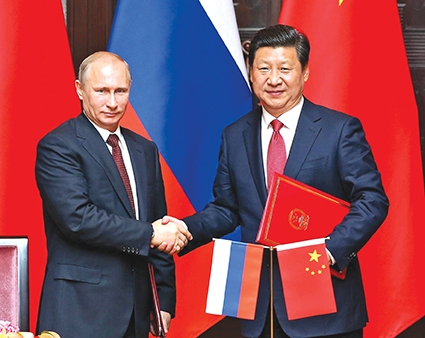Russia-China Cooperation Grows but So Does Distrust
Op-ed
Russian-Chinese relations have reached new heights in recent years. Several reasons have been in play: the China-sponsored Belt and Road Initiative and the need to cooperate with Russia (although it also needs to be said that the Russian route is not a major one); Western pressure on Moscow, and the need on the Kremlin’s side to reorient itself towards the East.
Although the countries could be seen as partners in their trying to limit the US’ dominance and in working together on many security issues in Central Asia, the South Caucasus and the Korean Peninsula, they nevertheless share different geopolitical imperatives. Russia wants the former Soviet space closed to any foreign interference, while for China, Central Asia and the South Caucasus represent very good avenues for extending its reach towards Europe.
China made significant progress in increasing its economic and political clout in Central Asia over the past decade. Central Asia, home to over 65 million, is a landlocked region of five countries: Kazakhstan, Kyrgyzstan, Uzbekistan, Tajikistan and Uzbekistan. From the Chinese perspective, these, along with Mongolia, represent two major transit routes which will make a large part of Beijing’s One Belt One Road initiative operational.
True, that from the Russian perspective, cooperation with China in the economic realm in Central Asia serves Russian interests, as investments from Belt and Road could alleviate the region’s low economic development and mitigate security problems. However, Russia is also worried that as China reaches strategic successes in the economic realm with the Central Asian countries, the more likely it is that Beijing will get more involved security-wise to protect its vital infrastructure. Indeed, China has reasons to be concerned, as Xinjiang remains a problem, and Central Asian fighters return home from the Middle East. There were already signs of deeper problems when, in August 2016, a Uighur national ran a car into the Chinese embassy in Bishkek, Kyrgyzstan, where it exploded, leaving several people injured. Instances like this could drive Beijing into assuming bigger a military posture in Central Asia.
Further west, in the South Caucasus, China has close trade contacts with all South Caucasus countries and has increased its investments in the region. For instance, China is now Georgia's third-largest trade partner (the first two places being occupied by Turkey and Azerbaijan and the fourth by Russia). Trade between the two countries increased from approximately $115 million in 2006 to $820 million in 2014-2015. In 2017, China and Georgia finally signed a free trade agreement during the visit of the Georgian delegation to China in May.
It is true that the Chinese presence in the South Caucasus for the moment is only limited to economics. However, in the long-term perspective, the deeper Beijing is involved in defending its assets in the former Soviet space, the bigger the possibility that the country will eventually become a big security player in the South Caucasus. Despite potential cooperation between Russia and Moscow on numerous issues regarding terrorism, separatism and general political security, the two giants’ geopolitical imperatives would still be at odds with each other.
On a much larger scale, there is also the rarely discussed issue of Russia’s far eastern provinces which border China. As we discussed, China is feared in Russia. Indeed, it is not openly said as only cooperation efforts between the countries are publicly touted. However, in Moscow, politicians see that in the long run China could be not only a source for development of the Russian Far East, but also a problem. And the major reason for that is the lack of population to counter potential Chinese settlements. When Russia acquired its Far East provinces, including modern Vladivostok, from China in 1858 after the Aigun Treaty, both Romanov and Soviet civil and military establishments founded colonies along the River Amur and deep in East Siberia. Back then, 19th century China was a weak, decentralized power and the major European powers had little difficulty in convincing Beijing to follow Europeans’ wishes. Still, Russia has not been able to effectively exploit Siberian resources. Moscow is also worried that with around only six million Russians living near Russia’s Chinese border, tens of millions of Chinese living on the other side of the Amur River will be a decisive force.
Emil Avdaliani












